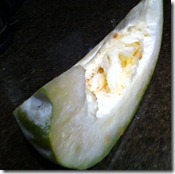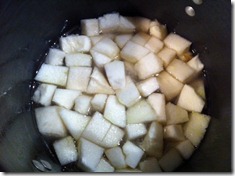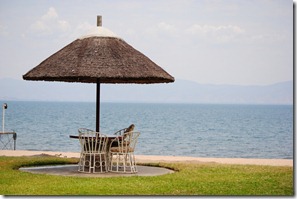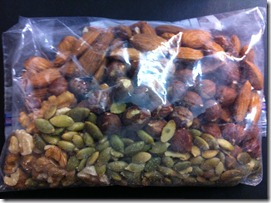Winter Melon Pork Spare Ribs Soup
 The weather has been amazing this weekend, but I know that winter is just around the corner. It therefore seems very apt to start cooking some winter melon. If you’ve never heard of winter melon, then you might know it instead as white gourd (note: fuzzy melon is not the same thing although it can look similar). Still doesn’t sound familiar? Well, it’s a vegetable that can grow as large as a pumpkin but has green colored skin with a white coating, and although it’s called a “melon,” it’s not sweet, and people generally eat it cooked rather than raw.
The weather has been amazing this weekend, but I know that winter is just around the corner. It therefore seems very apt to start cooking some winter melon. If you’ve never heard of winter melon, then you might know it instead as white gourd (note: fuzzy melon is not the same thing although it can look similar). Still doesn’t sound familiar? Well, it’s a vegetable that can grow as large as a pumpkin but has green colored skin with a white coating, and although it’s called a “melon,” it’s not sweet, and people generally eat it cooked rather than raw.
If you’ve never heard of it, part of the reason is likely because winter melon is typically grown in Asian countries. Consequently, the easiest place to find it here in the U.S. is at your local Asian grocery store. In China, winter melon is used in a variety of recipes, but one of the best and most popular is a soup that just happens to be very locarbolicious! The recipe details are below, but generally the soup consists just of winter melon and pork spare ribs. Believe me (partially because I just ate some soup tonight) – this soup is delicious and offers a nice combination of meat and vegetables as well as some warmth during the winter months! Here’s the simple recipe:
Ingredients (makes 4 servings)
- 2lbs of pork spare ribs chopped up into 2-inch long small ribs (I ask the butcher to cube it for me – it’s much easier and quicker that way). If you don’t have or like pork spare ribs, you can substitute beef ribs or other red meats, but preferably always with bone in the meat. You can buy pork spare ribs in most large Asian supermarkets (or I got it at my local butcher’s shop in New York, Esposito’s Pork Shop, on the corner of 38th and 9th Ave).
- 2-3lbs winter melon chopped into 1 inch cubes (you can usually buy just a slice of winter melon like the slice pictured above) – I bought this in Chinatown.
- 1 tablespoon of coarsely chopped fresh ginger.
- 3 tablespoons of chopped spring onions.
- 1 teaspoon of Sichuan peppercorns (easy to get in Asian supermarkets or online).
- 3 star anise (easy to get in Asian supermarkets or online).
- a spice or tea infuser (a small metal mesh container that allows the spice flavors to disperse into the soup without the spice itself being left in the dish – it’s a hassle picking out the peppercorns and star anise in soup, so I like to put them all into the infuser and just submerge the infuser in the soup).
- 2 tablespoons of salt.
- 1/4 cup of coarsely chopped cilantro (to add at the end).
Directions
- Place the 2lbs of pork ribs into a large pot and add cold water until it covers the ribs. Cook the ribs until the water boils, then pour out the water. This just rinses any blood from the meat.
- After pouring out the first load of water, add around 8 cups of fresh cold water into the pot (if you want more soup then add more water). Make sure there’s enough water to cover the ribs and that there’s space in the water for the winter melon too!
- Add the 2 tablespoons of salt, the 3 tablespoons of chopped spring onions, and the 1 tablespoon of coarsely chopped fresh ginger to the pot.
- Place the Sichuan peppercorns and star anise into the infuser and drop the infuser into your pot.
- Cook for an hour on a medium heat with the lid on if you have a lid to the pot (the water should be just boiling/bubbling a little).

- Add the chopped winter melon into the pot and cook for another 45 minutes with the lid on or until the melon looks translucent and is soft and easy to cut with a fork.
- Ready to serve – put 2 or 3 pieces of ribs into a bowl with some of the broth and 6 or 7 pieces of the melon.
I was planning to take a nice photo of the soup all pretty in the bowl, but it was so good that I completely forgot about the photo (this happens a lot actually!). Oh well, I will put up a photo next time I make the soup!
…But, I’m on Vacation!
 I love travelling and going on vacation. However, vacations almost always threaten to unravel months of dieting, careful eating, and general struggle (not to mention a lot of sweat and tears).
I love travelling and going on vacation. However, vacations almost always threaten to unravel months of dieting, careful eating, and general struggle (not to mention a lot of sweat and tears).
It’s super easy for me to blame the limited food options at the airport and on the planes, as well as the need to experience the full breadth of the local cuisine in other countries. Really, though, vacation not only releases me from the stresses of work, but also severs the already loose strands that tie me to a diet. And I don’t just go off the diet a bit, I got off it in a completely devastating way.
My vacations often seem to revolve entirely around eating. Where I’m eating my next meal at any given time is carefully arranged beforehand, and when I arrive at the predetermined restaurant, my eye immediately scans the menu and generally falls to the most unhealthy dish possible. Likewise, my hand detaches itself from from my brain and goes directly to the bread basket. Despite the seemingly unthinking nature of my actions, the true problem is really one of mindset – anytime I make one of these unhealthy food choices while travelling, there’s this small but powerful voice in the back of my head repeatedly chanting: “I’m on Vacation. None of this matters right now.”
Is there any hope???
Recently, I’ve decided to attack my vacation diet woes before I vacation, and you’d be astonished what a little forethought has been able to do. In general, there are 2 Things You Must Do in order to avoid reversing your dietary achievements while vacationing:
Pack Snacks for the Journey
This is, by far, the single most important thing you can do, but it’s a bit counterintuitive. After all, the amount of time you’re travelling is typically much shorter than the amount of time that you’re actually on vacation. Even so, if you start eating badly on your way to your destination, there is almost no chance that you’ll be able to convince yourself to restart your diet while you’re there. Consequently, you absolutely must pack sufficient healthy snacks and meals for your journey (whether by plane, train, or automobile).
There are a few easy snacks that you can pack for your trip – it’ll save you money on expensive and awful food as well as keep you on a low carb diet.
1. Nuts and seeds – you can easily make you own pack and sprinkle it with salt or other spices. You can see a picture (just above) of my pack for the flight (it has almonds, hazelnuts, pine nuts, and walnuts).
2. Jerky – you can buy (or make) beef or turkey jerky pretty easily. The beauty of jerky is that it will not spoil, takes up relatively little space to pack, and won’t cause a mess. In addition, it’s the most filling of the options listed here and is my personal favorite.
3. Fruits – too much fruit can be the downfall of a diet, but a few apples, pears, or similar fruit will be ok (berries are good but are tougher to pack and messier to eat).
4. Deli meat – this won’t keep for long if you don’t have some form of cooler, but it can be great as breakfast if you’re leaving early in the morning or as a snack just a few hours into your journey. Deli meat packs easily in a Ziploc bag and isn’t messy to eat in a plane, train, or car.
As I noted above, starting your trip off on an unhealthy note will only set the tone for the rest of your vacation and make it almost impossible for you to recover. That’s why it’s essential that you plan ahead for you journey. Personally, I often pack more food and snacks than I’m even able to eat on the journey – doing so forces me to eat what I’ve packed (rather than airport food), since I’ll feel slightly bad about throwing away the food I’ve packed if I don’t finish it.
This leads me to my second suggestion:
Eat Smaller Portions on Vacation
You’re in a new country or a new state, and you want to try the local cuisine. It’s partially why you took such a long and arduous trip! Or else, you’re visiting relatives or friends, and they insist on taking you out to eat at all the restaurants that offer nothing for your diet.
The best thing you can do in these situations is to simply eat smaller portions. I hate calorie-counting diets or diets where I just need to eat less, since I always end up being hungry for the better part of the day. However, this is the more realistic and easier choice on vacation, since I’m typically moving around so much and seeing and experiencing new things.
If you’re like me, you really want to try lots of different local foods. The healthier way to do this is to eat lots of variety rather than simply “eating lots”. Instead of eating a whole pizza in Chicago, eat just one slice (if you’ve never had real deep dish, take my word that one slice is plenty for most of us). Travelling abroad to China where you’ll see some delicious-looking dumplings? Order 4 different kinds and eat 1 or 2 of each. The point is not to try to avoid the local food just because it may not fit into your normal diet routine. Doing so is impossible for most of us, since it would make our vacations generally miserable. Rather, experience as much variety as you can while on vacation, but limit yourself to smaller portion sizes.
If I’m really serious about not reversing gains that I’ve made recently, then I’ll try hard to keep a rough calorie count (it’s often difficult with foreign foods, but just a rough estimate is enough). I generally try to stick to my personal maintenance amount of calories. If you don’t know your daily maintenance calories, a very rough estimate is 1800 calories/day for women or 2200 calories/day for men (or use this calculator, which provides a slightly better estimate).
Vacations should be enjoyable and relaxing, and eating is a big part of how I relax and enjoy myself. However, that doesn’t mean that I need to come back from my vacation more stressed than ever about how I’ve ruined 2 months of dieting in just 1-2 weeks. With just a little planning and forethought, my recent vacations have become much healthier and no less enjoyable. As an added benefit, I actually feel better while on vacation!! If I eat really badly, I often feel sluggish and sleep away large portions of my vacation. Eating better allows me to have more energy to do activities and generally better enjoy my time while on vacation.
How about you? Any tips for how you combat dietary sabotage while on vacation?
